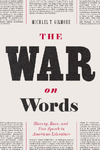Please use this identifier to cite or link to this item:
http://lib.hpu.edu.vn/handle/123456789/30010| Title: | The War on Words: Slavery, Race, and Free Speech in American Literature |
| Authors: | Gilmore, Michael T. |
| Keywords: | American Literature War Slavery |
| Issue Date: | 2010 |
| Publisher: | Humana Press |
| Abstract: | This book makes a large claim about the continuity of nineteenthcentury American literature, one that adds an element of complication to our usual understanding of the subject. Nobody can doubt that the Civil War marks a watershed between radically distinct cultural formations. On the antebellum side, the age of slavery, romanticism thrives, on the postwar side, Reconstruction—denounced by critics as romanticism in politics—fails to take root, and realism holds sway. Emerson, Fuller, Douglass, and Melville give way to James, Twain, Jewett, and Chesnutt. It would seem foolhardy to argue for a commonality among writers so obviously remote in historical context, gender, race, temperament, and popular reception. Beyond the (banal) fact of authorial nationality, what could possibly connect The Scarlet Letter (1850) to the Adventures of Huckleberry Finn (1885), or allow us to generalize about the rhetorical fl ights of Henry David Thoreau and Verena Tarrant and the aphonia of Babo and Dr. Trescott . |
| URI: | https://lib.hpu.edu.vn/handle/123456789/30010 |
| ISBN: | 0226294137 9780226294131 |
| Appears in Collections: | Technology |
Files in This Item:
| File | Description | Size | Format | |
|---|---|---|---|---|
| The-War-on-Words-Slavery-Race-and-Free-Speech-in-American-Literature-2165.pdf Restricted Access | 1.94 MB | Adobe PDF |  View/Open Request a copy |
Items in DSpace are protected by copyright, with all rights reserved, unless otherwise indicated.
